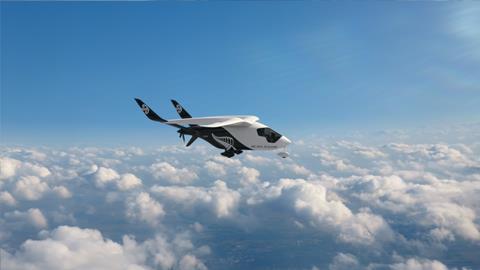Air New Zealand has secured an agreement that could deliver up to 23 of Beta Technologies’ all-electric conventional take-off and landing (CTOL) aircraft.
The companies said on 6 December that the agreement – which includes a firm order for one aircraft, options for two more and rights for a further 20 – will advance Air New Zealand’s goal of flying an all-electric commercial demonstrator aircraft by 2026.
”We need to accelerate the pace of change in technology, infrastructure, operations and regulation,” says Greg Foran, Air New Zealand’s chief executive. ”While this aircraft will add to – not replace – our existing fleet, it is a catalyst for that change.”

The aircraft initially will be flown for cargo-only missions through a partnership with New Zealand Post. The companies have yet to disclose the home airport or proposed routes for the incoming electric aircraft, but specify that they are considering low-altitude flights of about 81nm (150km) in length.
The CTOL variant of Beta’s Alia aircraft is on a more advanced delivery schedule than the company’s electric vertical take-off and landing (eVTOL) variant, but remains yet-to-be-certificated.
“The aircraft will only be brought into service once it has passed testing and is certified as safe to fly by the New Zealand Civil Aviation Authority,” the companies say.
Air New Zealand’s decision to partner with Beta comes after an “18-month period of evaluation and diligence” by the carrier’s Mission Next Gen Aircraft programme, which is working with three more companies in the electric aviation space – Cranfield Aerospace, Eviation and VoltAero.
Beta is not the only eVTOL maker eyeing operations in New Zealand. California autonomous aviation start-up Wisk Aero also has a presence in the country, where it recently completed flight trials in controlled airspace with its unpiloted fifth-generation aircraft.


























